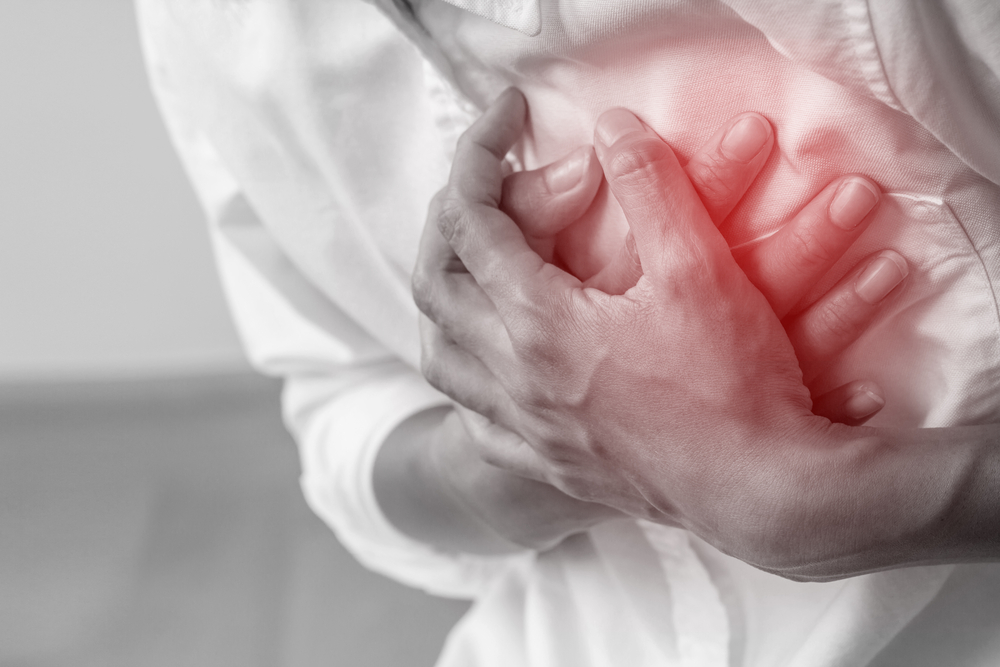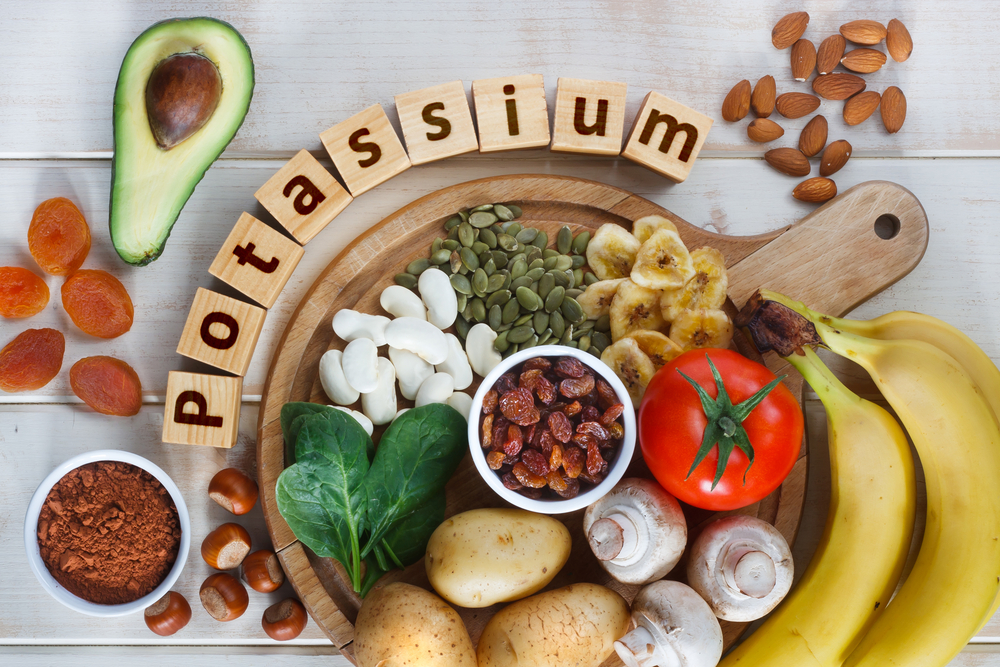Potassium is a mineral needed for many bodily functions, from muscle to nerve function. Unfortunately, most people do not consume enough potassium in their diets. Today’s Western diet tends to involve processed foods instead of whole plant foods that are naturally high in potassium. However, severe potassium deficiency is often caused by other factors such as malnutrition, fluid loss, and certain medications. Here are the symptoms to look out for.
Unexplained weakness and fatigue

All of the cells and tissues in the body require potassium to function. When it doesn’t have enough of this nutrient, the body can experience both physical and mental fatigue as a result. For instance, low potassium can cause the muscles to produce weaker contractions, making a person feel physically weaker.
Read More: 32 Signs You Have a Magnesium Deficiency & The Foods You Need to Start Eating Immediately
High blood pressure

Low potassium levels could cause high blood pressure, especially in people who consume a lot of sodium. A high intake of sodium commonly causes high blood pressure, but potassium’s function is to relax the blood vessels. This lowers blood pressure. That is why people with high blood pressure typically receive the advice to eat less sodium while consuming more potassium.
Muscle weakness and cramps

Potassium plays an important role in maintaining muscles in the body, especially the ones in the arms and legs. Deficiency could therefore cause weakness and cramping in these areas. It’s normal to lose small amounts of potassium while sweating. This is one reason why heavy sweating during a workout could cause cramps the next day.
Abnormal heartbeat

A symptom of severe potassium deficiency is an irregular heart rhythm. Since potassium is crucial for muscle function, the heart muscle can also be affected. Doctors could examine irregular heartbeats with an electrocardiogram (EKG). Without treatment, severe potassium deficiency could become life-threatening. But abnormal heart rhythm could also be a sign of another dangerous heart condition. So if you experience this symptom seek immediate medical attention.
Tingling and numbness

The sensation of persistent tingling and numbness is called paresthesia. It usually affects the arms, hands, legs, and feet when potassium levels are insufficient to maintain healthy nerve function. When it comes occasionally, tingling in the limbs is harmless. For example, when a leg falls asleep in an awkward position or due to a lack of movement. But when it persists, it could be symptomatic of an underlying condition. So bring it to the attention of a medical professional. [1]
Breathing issues

The respiratory system depends on several muscles to function, namely the diaphragm. However low potassium could hurt this function and make people feel short of breath or unable to take a deep breath.
Read More: The 5 Best Iron Supplements Available [Dosage For Deficiency]
Digestive issues

Potassium helps regulate muscle contractions, and that includes the muscles in the intestines. Deficiency could make the contractions in the digestive system weaker and less effective, leading to issues like bloating and constipation.
Frequent urination

Low potassium could negatively impact kidney function. Normally, kidneys work to balance fluid and electrolyte levels in the bloodstream, but potassium deficiency interferes with this and causes increased urination, called polyuria. It may be accompanied by increased thirst, called polydipsia. However, frequent urination could actively lower potassium levels. If you experience this, you should seek medical attention. [2]
We love New Roots Herbal 800 mcg Potassium Iodide, 100 Caps. Potassium iodide is the biologically active form of iodine, a critical mineral that helps with thyroid function, even if you have nuclear exposure. New Roots ensures that all ingredients that enter their facility are tested three times over for identity, contaminants such as mycotoxins (aflatoxins), PCBs, over 80 different pesticides, heavy metals, microbiology (bacteria), mold, and fungus thus ensuring the highest quality. Grab a bottle of New Roots Herbal 800 mcg Potassium iodide at The Health Shop for $22.77 while supplies last!
Causes of Low Potassium

Low potassium (hypokalemia) can occur for different reasons. Aside from eating a diet low in potassium, there are many contributing factors like fluid loss, malnutrition, medications, and pre-existing conditions. These can include:
- Excessive alcohol use
- Folic acid deficiency
- Chronic kidney disease
- Chronic diarrhea
- Excessive sweating
- Excessive laxative use
- Eating disorders and under-eating
- Diuretics
- Primary aldosteronism
- Vomiting [3]
If you are concerned about potassium deficiency, speak to your healthcare practitioner about getting a blood test. They could review your potassium levels and adjust your diet or medication if needed. Overall, treatment for low potassium tends to involve treating the conditions causing it. People on diuretics or other medications for kidney disease may need to find alternatives if they have low potassium. However, they should only do so under the direction of their healthcare practitioner. Otherwise, it’s recommended to increase the intake of foods high in potassium. Supplements should only be used under medical guidance.
Read More: Vitamin B12 Deficiency Symptoms that Most People Ignore
Foods High in Potassium

- Avocados
- Bananas
- Beans
- Beets
- Butternut squash
- Citrus juice
- Coconut water
- Dried apricots
- Fish (including cod, salmon, tuna, and haddock)
- Legumes
- Pomegranate
- Potatoes
- Salt substitutes
- Spinach
- Sweet potatoes
- Swiss chard
- Tomatoes
- Watermelon
- Yams [4]
We love New Roots Herbal 800 mcg Potassium Iodide, 100 Caps. Potassium iodide is the biologically active form of iodine, a critical mineral that helps with thyroid function, even if you have nuclear exposure. New Roots ensures that all ingredients that enter their facility are tested three times over for identity, contaminants such as mycotoxins (aflatoxins), PCBs, over 80 different pesticides, heavy metals, microbiology (bacteria), mold, and fungus thus ensuring the highest quality. Grab a bottle of New Roots Herbal 800 mcg Potassium iodide at The Health Shop for $22.77 while supplies last!
Signs of High Levels of Potassium

Hyperkalemia happens when the potassium levels in the blood become too high. This can be extremely dangerous since it could damage the heart and lead to a heart attack. All the while, hyperkalemia doesn’t always come with symptoms. People may not know they have it until they get a blood test. Anyone can have it but the risk increases for those with diabetes, Addison’s disease, alcoholism, congestive heart failure, kidney disease, and HIV.
While some nutrients have few or no effects when taken in excess, potassium can be dangerous, which is why supplements are not recommended unless prescribed by a health professional. Even then, potassium supplements are typically limited to 99 mg to prevent accidental overdosing. Therefore, it’s advisable to treat potassium deficiency with food or with supplements only under the strict guidance of a professional. Anyone who is concerned about hyperkalemia should speak to their healthcare practitioner about taking a blood test and a potential low-potassium diet. [5]
Read More: Chest Pain May Be a Symptom of a Common Vitamin Deficiency
Sources
- “Symptoms of Low Potassium (Hypokalemia).” Healthline. Katey Davidson, MScFN, RD, CPT and Ryan Raman, MS, RD. January 25, 2022
- “What to know about potassium deficiency symptoms.” Medical News Today. Rachel Nall, MSN, CRNA. April 30, 2019
- “Low potassium (hypokalemia).” Mayo Clinic. June 23, 2022
- “Potassium.” The Nutrition Source. March 2023
- “Hyperkalemia (High Potassium).” Cleveland Clinic. October 5, 2020

